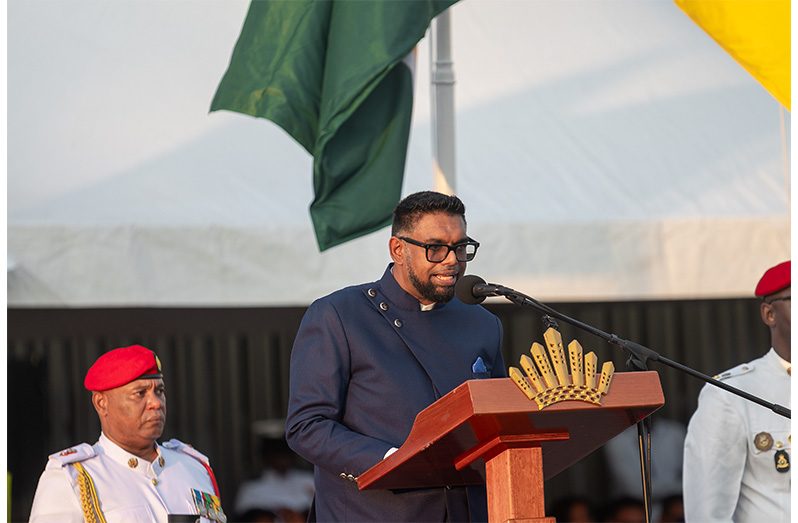—President Ali says, but affirms country will not tolerate attacks on Guyanese military personnel in Cuyuni region
COMMANDER-in-Chief of the Armed Forces President Dr. Irfaan Ali has reaffirmed that Guyana holds no hostility towards the people of Venezuela, despite the mounting claims to the country’s resource-rich Essequibo region by the Bolivarian Republic’s regime.
Speaking at the commissioning parade of the Guyana Defence Force’s (GDF) Standard Operating Course #56 on Wednesday, on the aggressive posturing by Venezuelan forces in Guyana’s Cuyuni region, the Commander-in-Chief of the Armed Forces made it clear that while the country remains committed to peace and diplomacy, it will not tolerate any acts of aggression against its citizens or military personnel.
“Guyana has no quarrel with the Venezuelan people; we have welcomed many of them who have come to our shores in search of a better life, just as our own citizens would have moved in our dark days of dictatorship, our dispute and the controversy is not born of hatred, nor does it prevent us from seeking to advance our relation, but we will not compromise our sovereignty,” President Ali said.
The border controversy is before the International Court of Justice (ICJ), which has twice reaffirmed its jurisdiction.
In 2023, the ICJ issued provisional measures ordering Venezuela to refrain from altering the status quo, however, “Venezuela persists with unilateral laws and threats of annexation, flagrantly violating international law, the UN Charter, and the very principles that sustain global order.”
“We must make the point that our territorial space will remain a space we will defend, and we will defend it with our partners. We’ll defend it with our allies. We’ll defend it with those who stand on the side of freedom, sovereignty, democracy, and the rule of law,” the President added.
On March 1, 2025, a Venezuelan Coast Guard ship had entered Guyana’s Exclusive Economic Zone (EEZ) near oil production equipment, specifically close to the FPSO Prosperity.
The Venezuelan vessel claimed the area was “disputed international waters” and made threatening radio communications to FPSOs operating there. This incursion was a serious breach of international law and has heightened regional tensions.
The incident drew widespread condemnation from the international community, including the Organization of American States (OAS), CARICOM, the United States, France, and other partners.
There were also reports of multiple armed attacks along the Cuyuni River by armed men in civilian clothing firing from the Venezuelan side recently.
Despite the aggression, Ali was resolute that Guyana would continue to rely on the rule of law and international solidarity.
He also stated that the country would continue to invest in its military capability, acquiring modern assets and ensuring its human capital is exposed to rigorous training.
“Our men and women in uniform stand ready to safeguard our territorial integrity and sovereignty, ensuring that our land, rivers, forests and resources from gold to Diamonds remain secure from those who might seek to exploit or plunder them by investing in modern equipment, rigorous training and strategic readiness, we equip our defence force to face challenges decisively and protect the wealth and potential of our nation,” the President asserted.
Back in August, the ICJ had notified the Government of Guyana that Venezuela had filed its rejoinder in the ongoing case concerning the validity of the Arbitral Award of October 3, 1899.
The filing, made on Monday, August 11, 2025, came within the deadline set by the court’s order of June 14, 2024. The rejoinder responds to Guyana’s reply, which was submitted in December 2024, and marked the conclusion of the written phase of the proceedings. This was welcomed by the Guyana government.
According to Guyana’s Ministry of Foreign Affairs and International Cooperation, the ICJ will, upon its return from summer recess, schedule oral hearings on the merits of the case.
These hearings will be followed by the court’s deliberations and the delivery of its final judgment. The decision, once issued, will be binding on both Guyana and Venezuela under international law.
The case before the ICJ concerns Venezuela’s contention that the 1899 Arbitral Award, which established the boundary between the two countries, is null and void. Guyana has maintained that the award is a valid and binding legal instrument that settled the border over a century ago.
In accordance with the Geneva Agreement, Guyana and Venezuela engaged in over two decades of Good Offices efforts on the border controversy under United Nations’ (UN) Secretaries-General auspices in an attempt to find a peaceful diplomatic resolution.
However, on January 30, 2018, after the process failed to produce meaningful progress, the then UN Secretary-General concluded that the Good Offices initiative had run its course.
In accordance with Article IV (2) of the Geneva Agreement, he exercised his authority and selected judicial settlement by the ICJ as the next method of resolution.
Guyana, in accordance with the Secretary-General’s decision, filed an application with the ICJ on March 29, 2018, seeking a ruling on the validity of the 1899 Arbitral Award and the boundary it had established.
Venezuela, rather than co-operating, challenged the court’s jurisdiction, arguing that the Geneva Agreement did not allow for judicial proceedings.
After receiving extensive written submissions from both parties and holding oral hearings in June 2020, the court issued its judgment on jurisdiction on December 18, 2020.
The court found that “Guyana and Venezuela mutually conferred upon the Secretary-General the authority to choose the means of settlement of the controversy, and on 30th January, 2018, the Secretary-General exercised this authority by choosing judicial settlement before the Court.”
The court affirmed its jurisdiction to hear Guyana’s application regarding the validity of the Arbitral Award and the related issue of the definitive settlement of the land-boundary controversy between Guyana and Venezuela.



.jpg)








